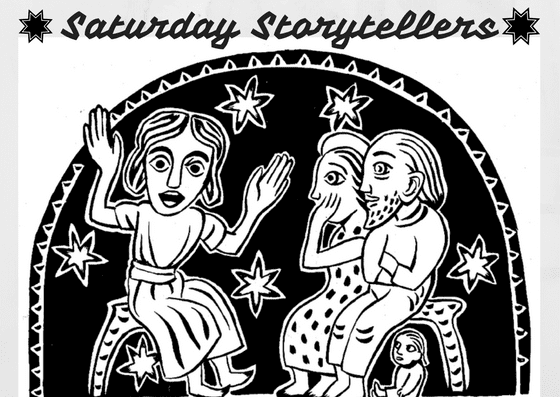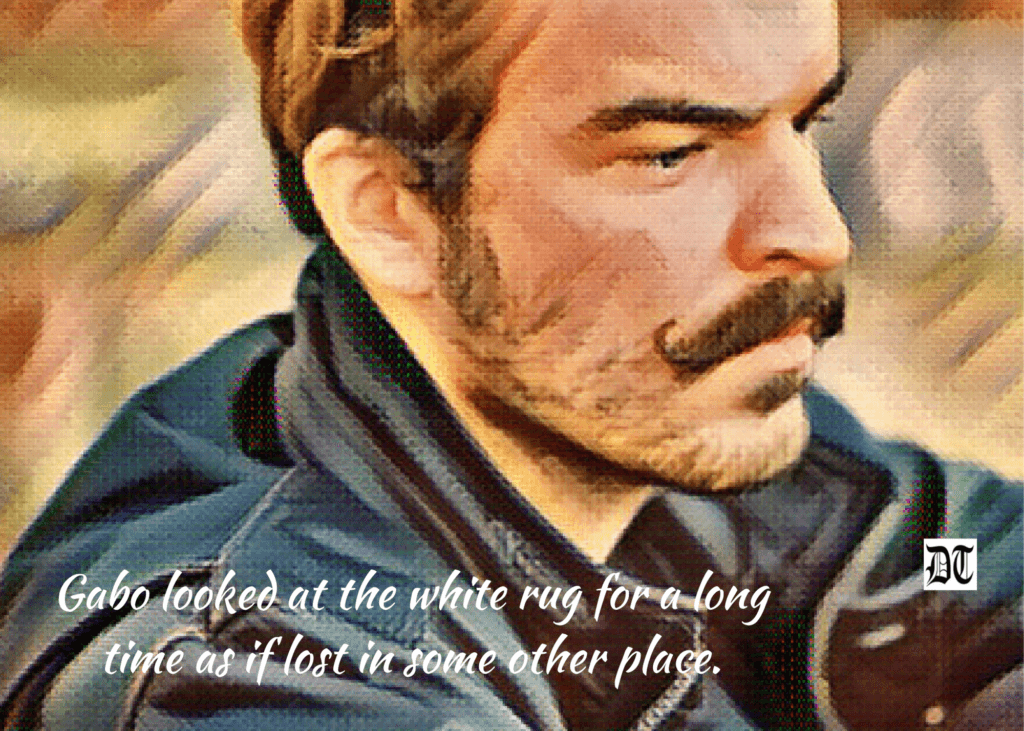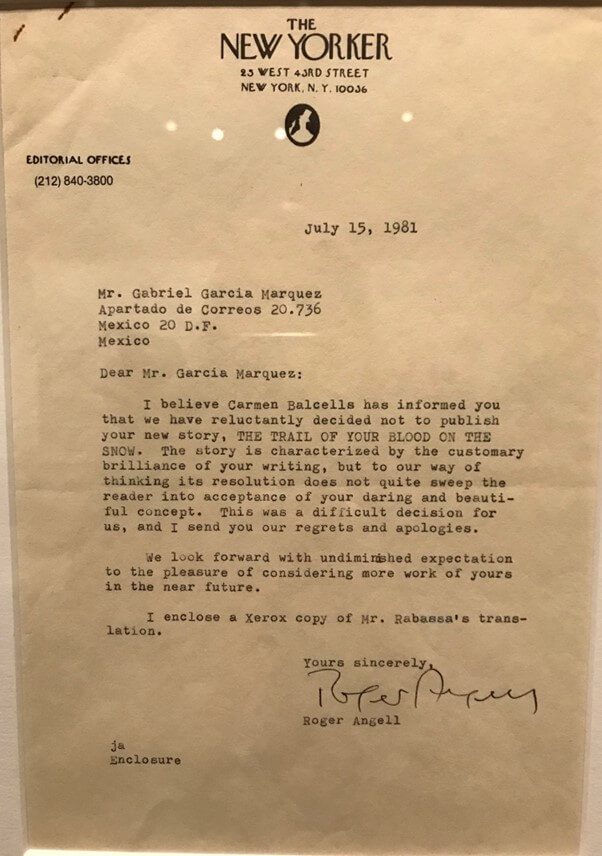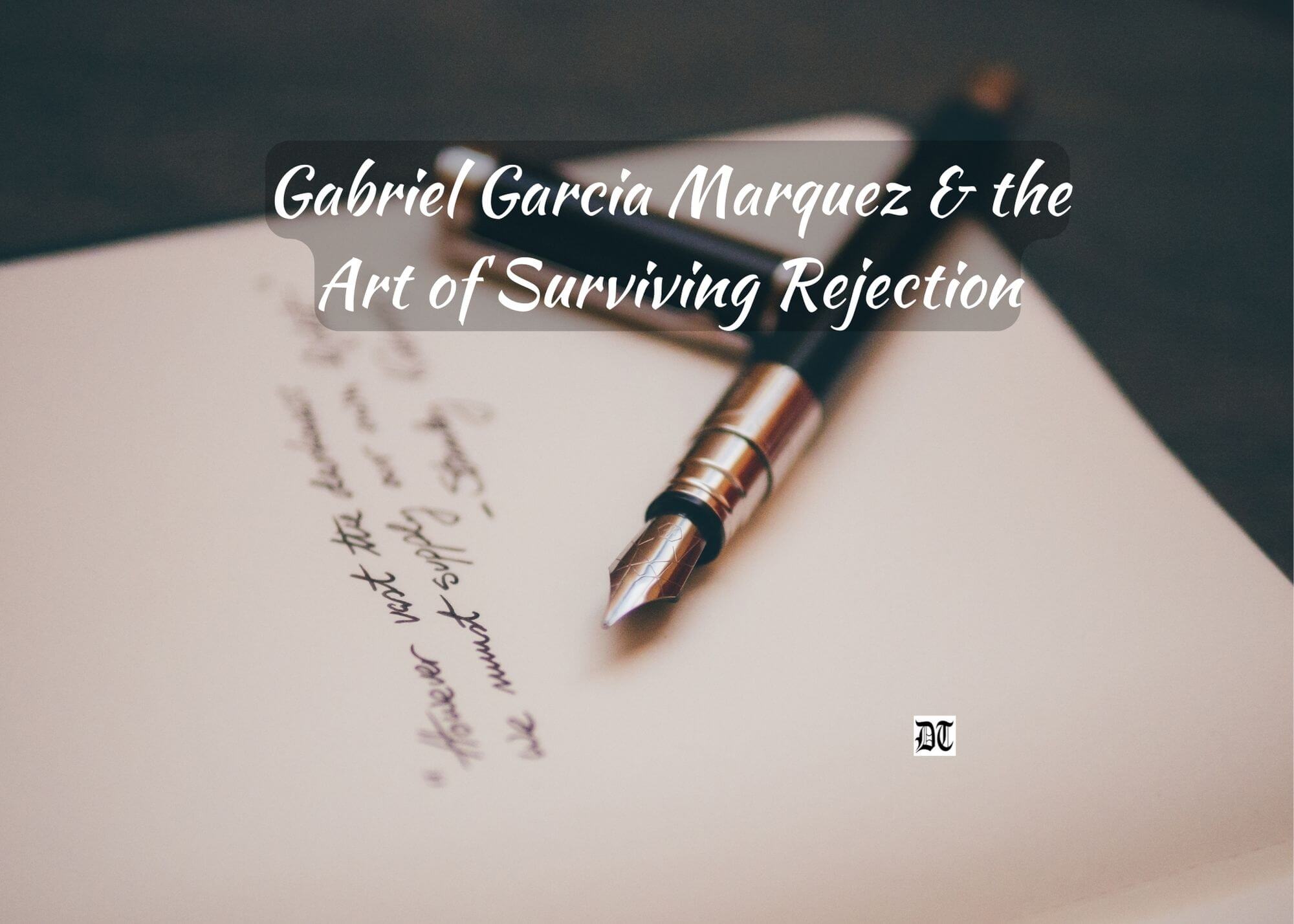Reading Time: 7 minutes
Here’s a radical fiction by Dr. Sunil, wherein he reimagines Gabriel Garcia Marquez’s writings and the strategy of surviving rejection. An exclusive for Different Truths.

“Sir?”
The man smiled. “I am Gabo to friends and family and…”
“…and?” asked Jose Arcadio.
“And readers because they are family. Intimate to a writer! Besides that, the readers complete the circle of the writer. Makes a writer whole.”
Jose nodded. Overawed by the solid presence of the author before him.
“Have you read Solitude?”
“Yes, sir. Who has not?” Juan replied.
“Call me Gabo, young man!”
Juan grinned. “You are a truly great man…and writer. My inspiration.”
Gabo smiled. “Mine was Hemingway. Writing is a long tradition…”
Gabo smiled. “Mine was Hemingway. Writing is a long tradition with its summits and valleys, a long line…”
“You broke that…”
“I took a detour guided by my predecessors. My masters. Somebody, after me, will take another detour…the pathway remains same, a bit twisted but steady, more or less.”
Juan jotted down furiously.
“Your name is interesting!” Gabo said, sitting in the study of his Spanish Colonial-style house in Mexico City.
“My mother. An avid reader of Solitude.”
He chuckled. “Good to hear that!”
“Certain works of imagination become real for you in most striking ways,” said Juan.
“Certain works of imagination become real for you in most striking ways,” said Juan. “They influence our daily lives, practices and thoughts. Solitude single-handedly changed the existing landscape and made the world “see” Latin America and human reality differently. Suddenly Juan Arcadio Buendia was a household name and part of our legacy to be reclaimed by succeeding generations. Mother did that by naming me after that iconic patriarch. Sometimes naming can do a lot…it can change you forever and make you think like the original.”
Gabo was smiling. “Impressive! Like your take, young man.”
“You smoked 60 cigarettes, while writing this epic?”
“Yes. Difficult to quit the habit but I managed somehow.”
Juan nodded. “How did you manage to quit that addiction? Tough, is it not?”
“I wanted to live. Quit coffee also.”
“Inspiring!”
“What brings you here, my friend?”
“I wanted to seek your advice.”
“About?”
“Writing and rejection…rejection or writing. How could you manage that…?”
“Writing and rejection…rejection or writing. How could you manage that as a young and obscure writer, not sure of the success of a dense novel, now hailed as one of the world-altering books?”
Gabo looked at the white rug for a long time as if lost in some other place.
His deeply-lined face furrowed further, and moustache quivered – earth burnt by the sun! thought the visitor, looking at the most-photographed face.

Gabriel Garcia Marquez, framed by the curtains and books, looked like a formidable character of his own work…
Gabriel Garcia Marquez, framed by the curtains and books, looked like a formidable character of his own work; remote, yet accessible, by a strange process called reception; a cultural practice of decoding figures, texts and artifacts of significance, untouched by the paleness of time.
Few minutes passed – a long spell, if sitting in the study of a man who revolutionised ways of seeing.
Juan waited.
Gabbo kept brooding.
The young man answered: “I was asked by the editor of the Bogota Journals to do a literary interview…
The young man answered: “I was asked by the editor of the Bogota Journals to do a literary interview, after a rejection by The New Yorker editor resurfaced here, in 2022.”
Gabo listened.
“I told my eccentric editor: how can I talk to a dead author?”
“What did he say?”
“He said, authors never die. Just change a state. Engage with the texts where they hover as ghosts. Find the entry point there and enter that space. Discover and listen to a voice transmitted to you across the long gulf. Pay attention—and you will be able to listen!”
“Right.” Gabo agreed. “This is how you talk to Poe or Virgil or Cervantes!”
Juan replied: “Yes. He also directed me, as an option, to visit your home. Feel the silence there, the smells, sounds, views – that is what he told me. Visualize your sense of Marquez; construct your version of the author, not the hearsay or as per the folklore or second-hand view.”
“Brilliant!” Gabo exclaimed.
“Remember Juan. You will find a spectral presence of the author in their familiar settings…”
“Remember Juan. You will find a spectral presence of the author in their familiar settings – and works left for the posterity. The time preserved in their estates can be a good aid to understand them first hand. Go. Meditate. And you get the right answers in those silent landscapes and innerscapes.”
Gabo seemed to be enjoying the conversation with a young journalist who wanted to be a writer.
Juan paused. Surveyed the study and then addressed the man sitting in the chair opposite: “I agreed with my editor about you, a talented man destroyed by alcoholism and women but a sharp mind and well read, once sober. It was a pilgrimage for me, anyway. He was sure of the outcome. Said, you will have answers to your questions in a mode you will understand easily. We actually reproduce artists out of such interactions and pursuits. Odd theory but it sounded plausible.”
“True!” Gabo said.
“Not every writer of your own city you can meet. Their works are portals to their selves. Listen to those accessible internal regions and catch the movements there,” Jose continued.
Gabo laughed an open laugh, bushy brows moving.

“This rejection by NY intrigued me also and showed the human side of a difficult job. How can we err!” Juan observed wryly.
Gabo recalled. “Oh! That was in the year 1981.”
“How arbitrary, this system of rejection! The editor rejected not an ordinary writer but a genius and failed to comprehend the enormity of that gesture.”
Gabo was bemused. “Dear, I never thought I was a genius. In fact, while writing Solitude, this idea never crossed me. A writer working hard to finish a vision, not sure of its reception and publication initially. Worried about finding a good publisher. Trying to pay bills. Selling off things. Well, you are a writer first. Suffer mandatory self-doubts. Nobody can be sure of the success of their books. Rejection is part of the writing process. It made me work hard.”
“How that editor would have felt after learning that you got the Nobel a year later, in 1982!”
A long pause later, he said, “Does it matter? He did what he was supposed to do. I did what I was supposed to do…”
Gabo did not reply. A long pause later, he said, “Does it matter? He did what he was supposed to do. I did what I was supposed to do. Editors are fallible, whatever they might think. Rejections do not stop a committed writer from writing. They ought not to. But craftsmanship….”
He took a longer pause. Then: “I was taught craftsmanship by Hemingway mainly and by Virginia Woolf, Joyce, Faulkner and Borges about writing technique, interior monologues, evoking atmosphere. These influences shaped up my inner universe and made me express stories told by my grandmother in my own style.”
Jose listened as if in a trance. Soaking in every sentence.
“Remember young man, a genius is that person who is sure of his vision and is not stopped by editors…”
“Remember young man, a genius is that person who is sure of his vision and is not stopped by editors limited by their biases. In that sense, every new voice, every germinating sapling, is a miracle. Every act of writing is an act of changing the stasis by bringing in fresh winds of change.”
“That is comforting! These takeaways from a Master! I was desperate and wanted to quit, as nobody was keen to listen to my voice in a market searching for the next best seller or fantasy only.”
Gabo laughed and said, “Never despair by rejection. Life is full of surprises and contradictions. Whenever you feel like quitting, better quit addiction, if any!”
Jose nodded.
… Writing is like carpentry and the hand-made work is an exquisite piece of art!…
“See, writing itself is a reward. Not many writers get their due. Does it matter? Writing is like carpentry and the hand-made work is an exquisite piece of art! One must keep on working as a carpenter. Even if one work is bought in the market, that is enough for the day.”
“Sure, Master!” Jose replied.
“One more thing. Genius is a person rooted in the heart of their land, people and the collective songs of the previous generations but heard again and again by a new pair of ears.”
“That is beautiful!” Jose exclaimed, in a trance by this encounter.
Gabo looked at him with affection.
“Ultimately, writing is about that lusty song one writes on the wet sand with a moving finger…”
“Ultimately, writing is about that lusty song one writes on the wet sand with a moving finger and then it merges with the sea through a hungry wave and finally, finds a blue home in the restless ocean; seen or unseen but a song straight from a full heart and quivering lips, kissed by a wind and sky and cloud, becoming one with nature, like other earlier songs or thereafter, in a ceaseless operation of destruction and creation and recreation; imaginings and re-imaginings, a unique creative act done in succeeding minds to claim and reclaim voices about to drone out in that vast sea out there, on a brilliant morning or cloudy evening. Rejections. Re-workings. Recreations. The cycle goes on and new songs get produced. We all find our voices and move on…Oblivion. Resurrections.”
A typical magic-realist region of discovery!
The spell was over.
Juan was sure he wanted to be a writer of magical things.
And a reader to experience the old world as new!
Picture design by Anumita Roy, Different Truths
















